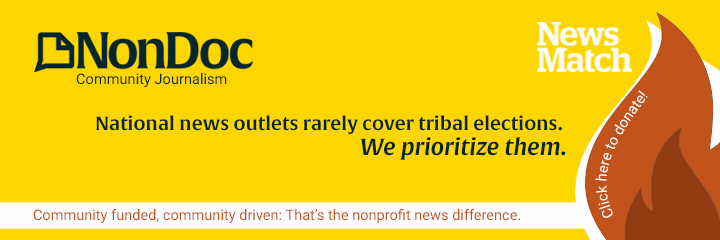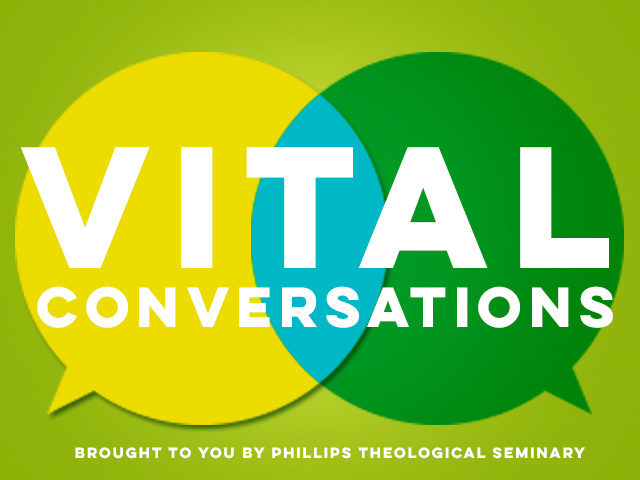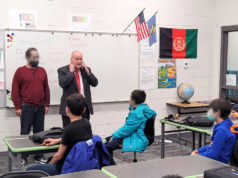
(Editor’s Note: Vital Conversations is a running series of commentaries from various faith leaders. The series is sponsored by Phillips Theological Seminary, though many contributions — such as this one — come from theologians who are unassociated with the seminary.)
A response to a recent invitation of mine really caught me off guard.
I am a minister, so I regularly invite people to attend our church. The responses I get from these invitations can be rather interesting. Some want to know to what denomination our church belongs. Others want to know how many people come on a given Sunday or what kind of music we use in worship. Still others are clearly not interested in coming but struggle to find a nice way of saying that to me.
But here’s one I’d never heard before. After inviting a young lady and her family to church the next Sunday, she said that while she would like to come, her husband probably wouldn’t because he is “a science person.” There was a short awkward silence before I happily exclaimed, “Great! We are science people, too.” I’m sure that really confused her.
What I was trying to say is that my Christian faith does not see science as an obstacle to my beliefs. And I say that not because I insist on believing things that science has clearly proven otherwise. I say this because I do not believe that the Christian faith requires us to be afraid of truth. Jesus wanted his followers to know the truth (John 8:32), so as a Christian, I want to be a truth seeker. I realize that many of us who have strong religious convictions can sometimes be closed to evidence that appears to contradict our beliefs. But on this score, most of us are guilty, religious and irreligious alike. Here are two ways we can all be better truth seekers.
First, have an argument. Speaking at a town hall appearance in Iowa recently, President Barack Obama encouraged college students to have an argument with anyone who disagrees with them on any particular subject. I agree with him, and think this is good advice for everyone. Argument is an important way we learn. It is a great way to pursue truth. The old adage that discourages people from discussing religion and politics with others is meant to keep the peace between people who have different opinions on such matters. But it is a shame that too often we stay away from conversations that matter — vital conversations — and only talk about things that won’t offend anyone.
Many of us become uncomfortable when we are challenged on our core beliefs, so we tend to stay away from topics about which people most often disagree. We don’t like to argue. But a good argument need not become a quarrel. There is a difference between the two. Perhaps the character Cyril Smith in G. K. Chesterton’s play “Magic: A Fantastic Comedy” puts it best when he says, “I object to a quarrel because it always interrupts an argument.” If we are going to be truth seekers, then we have to learn the art of the argument and stay away from quarreling. Unfortunately, we seem to be losing this art.
A second way to be a truth seeker is to lose an argument. Not on purpose, of course, but the whole purpose of an argument ought to be to seek the truth in the matter. “The truth,” noted famed mathematician Blaise Pascal in his Preface to the Treatise on Vacuum, “is always older than all the opinions men have held regarding it.” And yet many of us are far more interested in holding to our opinions than we are in pursuing the truth. One of the clearest ways this can be seen is when we are proven wrong. If, in that moment, we continue to defend ourselves and our opinions, it is a good indication that we care more about winning than learning.
Truth seekers are more interested in what is right than in being right. They will never mind losing a debate if it means arriving at the truth. If our desire is always for the truth, then we ought to be thrilled to be proven wrong because the “win” is in arriving at the truth, not in winning an argument.
By engaging in vital conversations with people who disagree with us, we can all be better truth seekers. Whether we end up changing our minds on a subject or not, we will learn from one another. And that is something that benefits us all.
To reply to this Vital Conversation directly, please submit letters for publication to letters@nondoc.com. To propose a full Vital Conversation commentary, please e-mail editorial@nondoc.com.






















